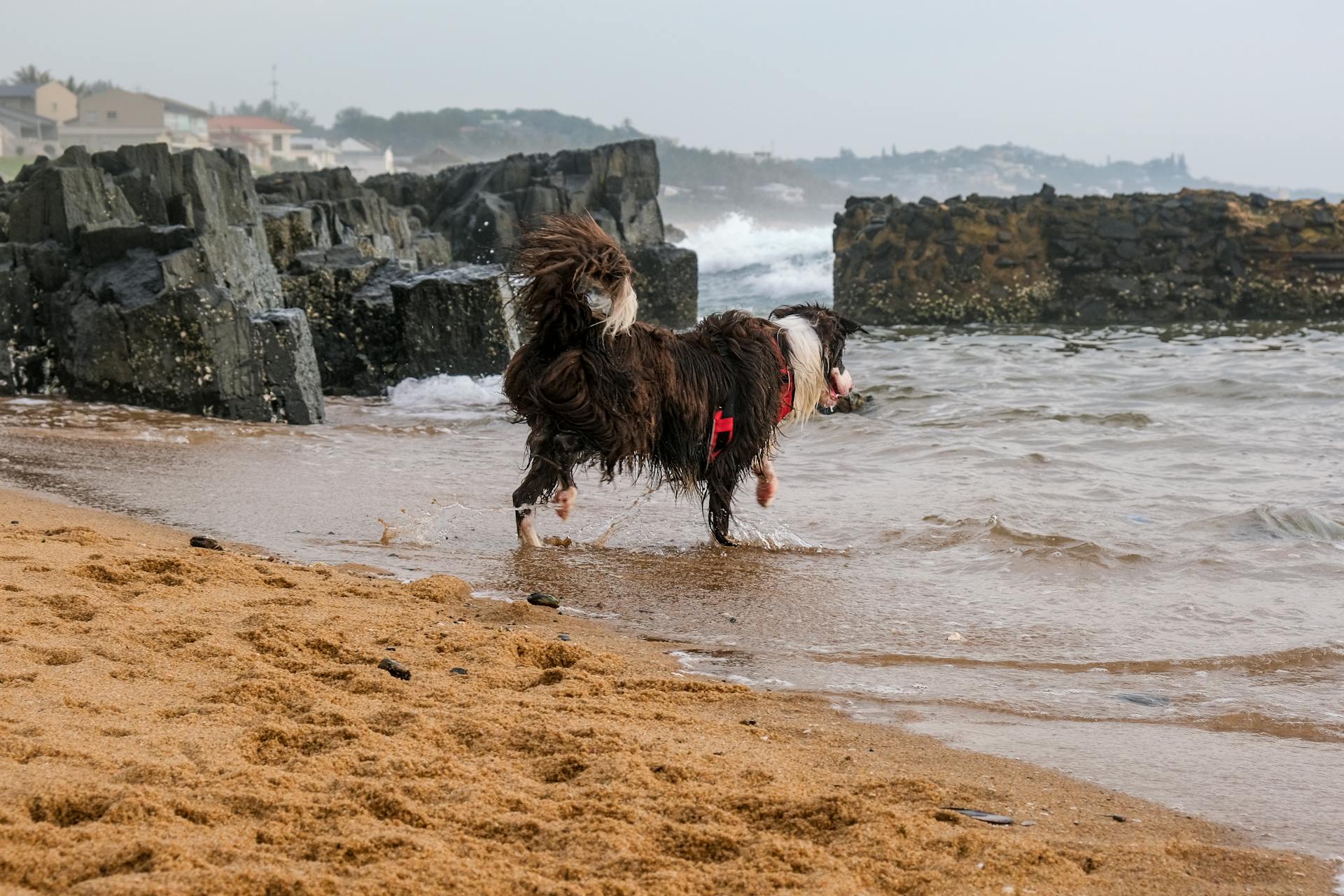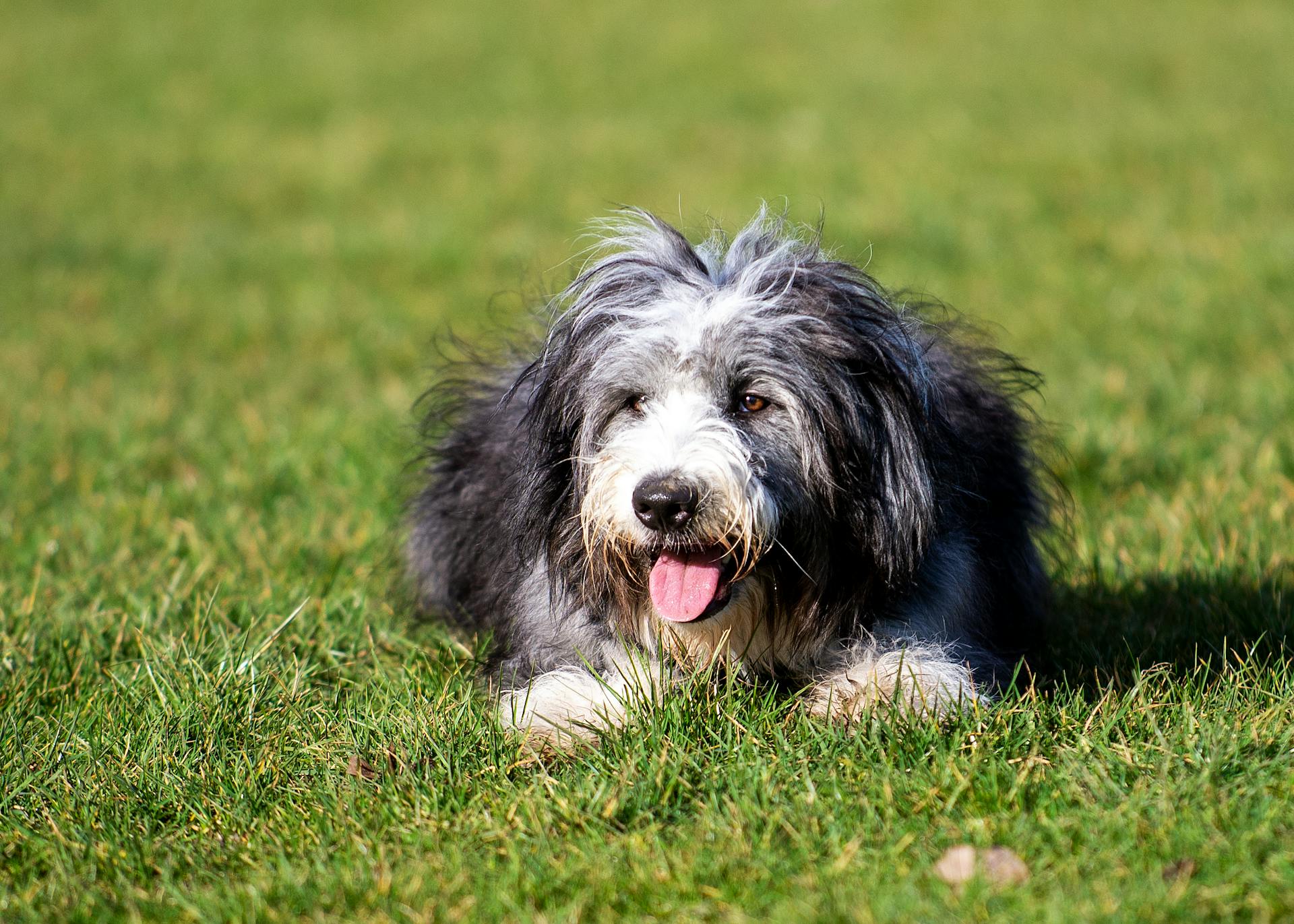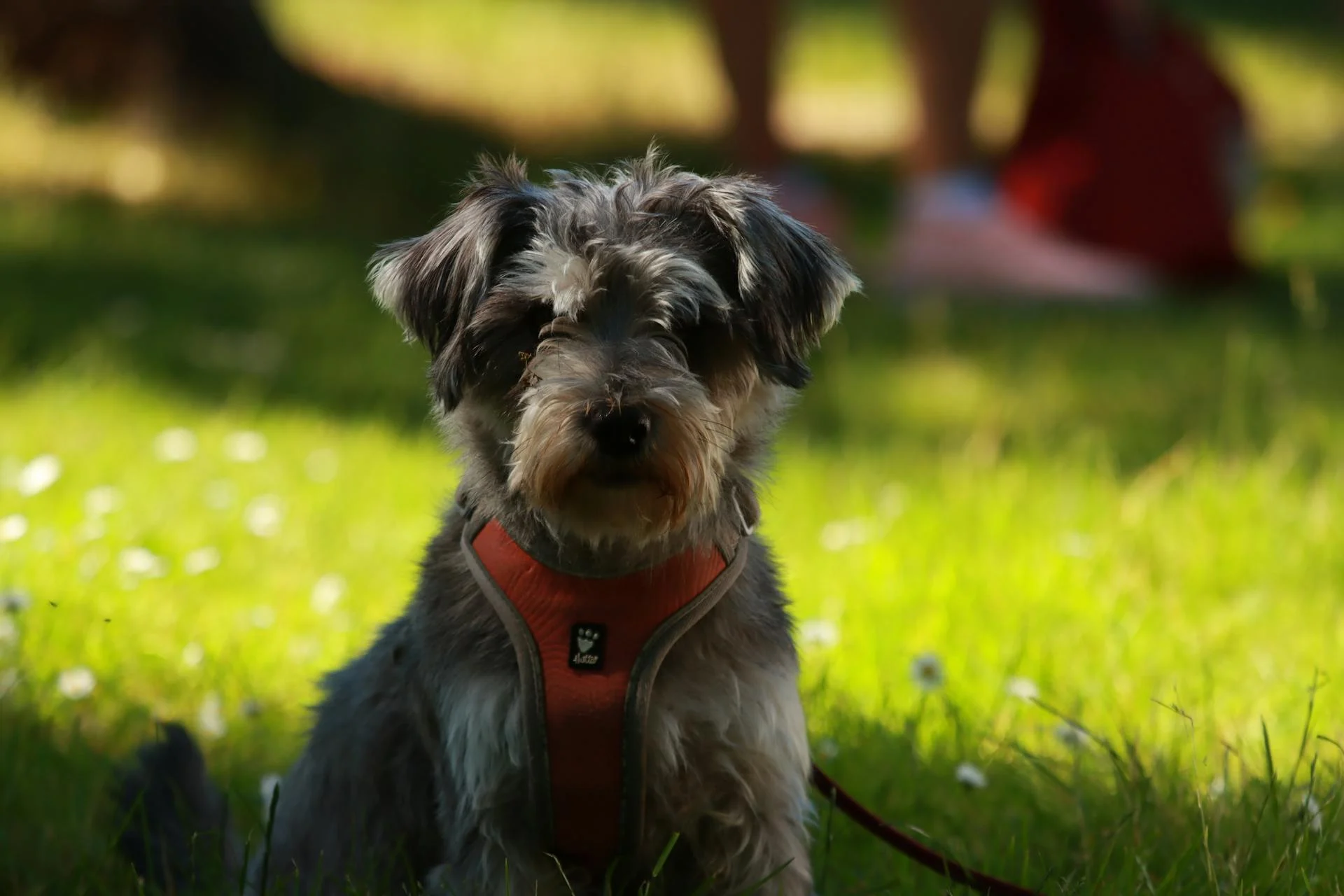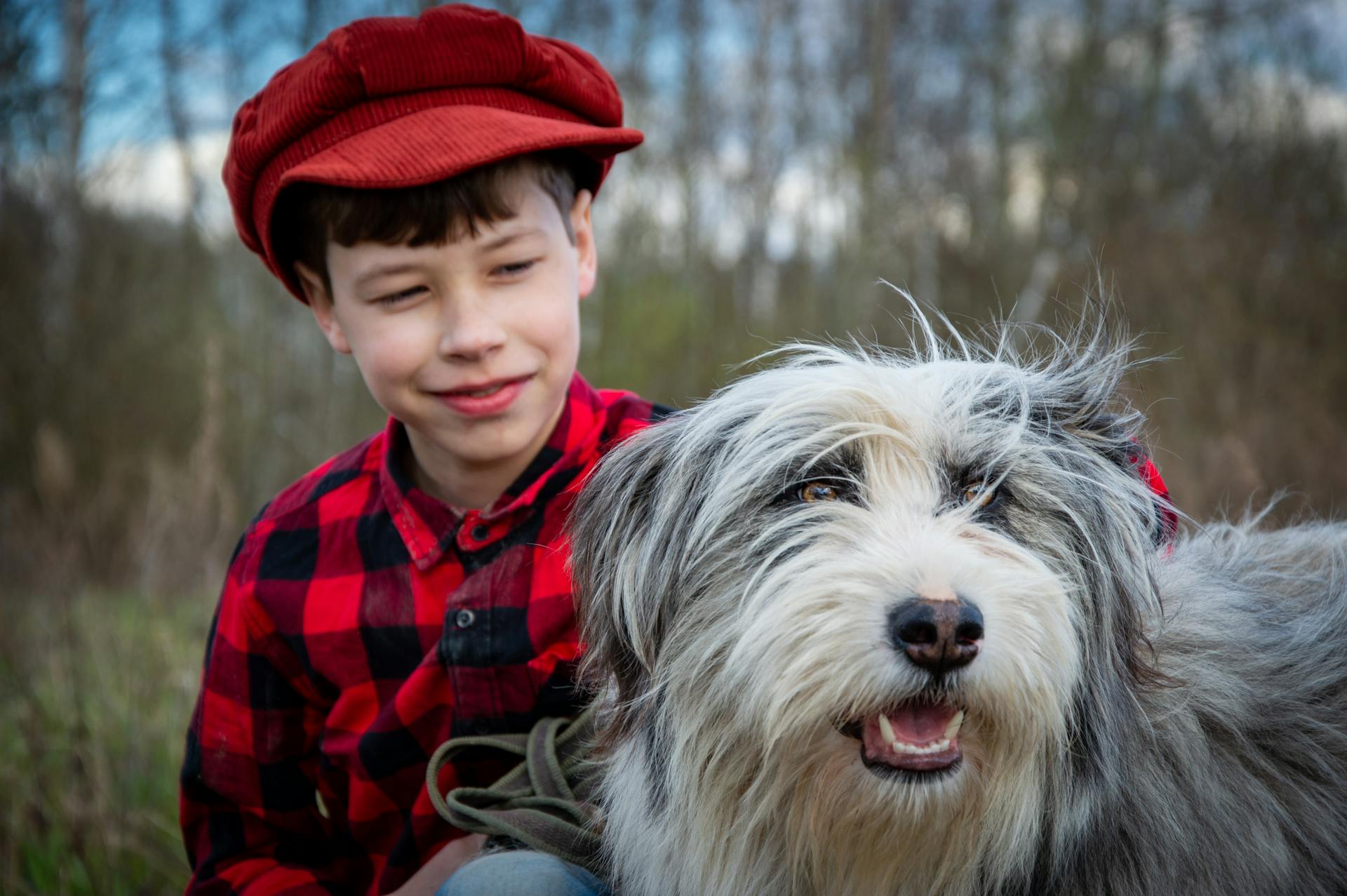
Welcome to the world of Bearded Collie puppies! These adorable balls of fluff are sure to capture your heart with their playful, curious nature.
Bearded Collies are a medium-sized breed, weighing between 40-60 pounds and standing 22-27 inches tall.
To bring a Bearded Collie puppy home, be prepared for a significant commitment - they require regular grooming to prevent matting and tangling of their beautiful coats.
Bearded Collies are highly intelligent and trainable, but they can be stubborn at times, so consistency and positive reinforcement are key.
With proper care and attention, Bearded Collie puppies can grow into wonderful companions, full of energy and enthusiasm for life.
Physical Characteristics
Bearded Collie puppies are a joy to behold, and their physical characteristics are just one of the many reasons why. Their shaggy double-coat is a defining feature, bouncing in the wind as they run with agility and speed.
Their ears are a notable feature, with floppy ears that hang down and are covered in long hair. When they're particularly alert, their ears tend to perk up at the base.
Bearded Collies have large, expressive eyes and arched eyebrows, with eye color that corresponds to their coat. Black dogs have dark eyes, while silver dogs have blue-gray eyes.
Here are some key physical characteristics to look out for in a Bearded Collie puppy:
- Ears: Floppy, covered in long hair
- Eyes: Large, expressive, with arched eyebrows
- Nose: Large, square-shaped, ranging in color from black to gray
- Coat: Double-coated, with soft undercoat and long, shaggy topcoat
- Coat Color: Varies from black to yellowish tan, with white or tan markings
- Tail: Long, hairy, often curving and swishing when excited
Highlights
Bearded Collies are highly energetic dogs, which is evident in their love for dog sports like obedience, agility, and rally.
Their shaggy coats come in various colors and add to their unique appearance, making them a standout breed.
Bearded Collies are friendly, social dogs who often enjoy the company of both humans and other pets, which is a great trait for families with kids.
With a natural herding instinct, they tend to be protective, making them great companions for families with children.
Bearded Collies are adaptable to various living environments, including apartments, as long as they receive adequate exercise.
Here are some key highlights of the Bearded Collie breed:
- Energetic and playful, excelling in dog sports like obedience, agility, and rally.
- Shaggy coats come in various colors, adding to their unique appearance.
- Friendly and social, enjoying the company of both humans and other pets.
- Natural protectors, great companions for families with children.
- Adaptable to various living environments, including apartments, with adequate exercise.
Appearance
Bearded Collies are a sight to behold, with their shaggy double-coat bouncing in the wind as they run. They weigh in around 50 pounds when full-grown.
Their ears are quite distinctive, hanging down and covered in long hair that tends to perk up at the base when they're particularly alert. This is a good sign that they're engaged and attentive.
Bearded Collies have large, expressive eyes and arched eyebrows that give them a perpetually inquisitive look. Their eye color corresponds to their coat: black dogs have dark eyes, while silver dogs have blue-gray eyes.
Their noses are typically large and square-shaped, ranging in color from black to gray. This is a good feature to look for when identifying a Bearded Collie.
Double-coated Beardies have soft, furry undercoats and long, shaggy topcoats. This double coat is a hallmark of the breed and requires regular grooming.
Bearded Collie colors range from black to yellowish tan, with some having white or tan markings. The coat color may sometimes lighten as they age.
Their long, hairy tails often curve and swish when they're excited, adding to their playful and energetic demeanor.
Here's a quick rundown of the Bearded Collie's key features:
Size
When it comes to the Bearded Collie's size, there's a notable difference between males and females.
A Bearded Collie male stands 21 to 22 inches at the shoulder.
Females, on the other hand, are slightly smaller, measuring 20 to 21 inches at the shoulder.
Bearded Collies typically weigh between 45 to 55 pounds.
Temperament and Personality
Bearded Collie puppies are born leaders, known for being inquisitive and independent. They thrive on activity, so it's essential to keep their minds and bodies busy to prevent boredom and unwanted behavior.
Bearded Collies are highly intelligent dogs that can be strong-willed, especially in training. They think their way is better, but with early training and socialization, they can learn to see that you're pretty smart too.
Bearded Collies are naturally herding dogs, bred for herding sheep. Their herding behavior can be an issue in chaotic households, but with proper training, they can excel in family homes.
See what others are reading: Alaskan Malamute Behaviour
These dogs are rambunctious at all ages, loving to chase, play, and run alongside their owners. They make excellent hiking buddies and love to come along on outdoor adventures.
In choosing a Bearded Collie puppy, look for one with a nice temperament, which is affected by heredity, training, and socialization. A curious and playful puppy is a great sign, and meeting the parents can help you evaluate what a puppy will be like when they grow up.
Here are some key traits to consider when bringing a Bearded Collie puppy home:
With proper training and socialization, Bearded Collie puppies can grow into well-behaved and loving companions.
Care and Grooming
Bearded collies are incredibly smart, but they do need help from their human families. This medium-sized dog needs lots of exercise, daily grooming, and plenty of human interaction.
To keep your Bearded collie's coat looking its best, you'll need to brush them daily, ideally for about 10 minutes, to prevent tangles. You can use a pin brush or a boar bristle brush for this task.
If this caught your attention, see: Do Border Collies Need to Be Groomed
Bearded collies have a soft undercoat and a long, somewhat rough outer coat, which means they shed all year round, but more heavily in the spring and fall. They may also need regular nail trimming, ear cleaning, and dental care to stay healthy and happy.
Here's a quick rundown of the grooming tasks you'll need to perform regularly:
- Daily brushing (10 minutes)
- Weekly in-depth brushing (30-60 minutes)
- Ear cleaning (once a week)
- Nail trimming (as needed)
- Dental care (daily teeth brushing and annual professional cleaning)
Remember, regular grooming is essential to prevent matting and keep your Bearded collie's coat shiny and healthy.
Care
Bearded Collies are high-maintenance dogs that require regular exercise and grooming. They need daily walks or play sessions with a ball for at least 30 minutes.
To prevent tangles and mats, brush your Bearded Collie daily with a bristle or pin brush, taking about 10 minutes. This will also help keep their coat shiny and healthy.
During shedding season, which lasts for 2-4 weeks, you'll need to increase the frequency of grooming to prevent stray fur around the house. This can be done by brushing your Bearded Collie more often, ideally 2-3 times a day.
Regular nail trimming is also essential for Bearded Collies. Use a grinder to minimize the risk of cutting the nails too short. You'll know your Bearded Collie needs a trim when you can hear their nails clicking on the floor.
To keep your Bearded Collie's ears clean, examine them once a week and gently clean them with ear cleaning solution and a cotton pad if dirt and debris are present. Avoid using cotton swabs, as they can damage the delicate inner ear structures.
A Bearded Collie's dental care is also crucial. Brush their teeth daily with a dog-safe toothbrush and toothpaste, and schedule an annual professional cleaning with your vet.
Here's a rough guide to grooming your Bearded Collie:
Food Requirements
The Bearded Collie's food requirements are a bit unique, and it's essential to get it right to keep them healthy and happy. They're prone to becoming overweight, so monitoring their calorie intake is crucial.
You'll need to work closely with a veterinarian to ensure you're not overfeeding your Bearded Collie. Treats should be avoided unless they're used for training, as they can lead to weight gain.
Commercial dog food should be of high quality and made with real meat protein as the first ingredient. This ensures your Bearded Collie is getting the nutrients they need.
Make sure the food is specific to your dog's life stage, whether it's puppy, adult, or senior. This will help you provide the right amounts of nutrients throughout their life.
For another approach, see: Puppys Food
Health and Wellness
As a Bearded Collie owner, it's essential to be aware of the potential health issues that can affect your furry friend. Bearded Collies are generally healthy dogs, but like all purebreds, they can be prone to inherited health issues.
Autoimmune diseases, such as hypoadrenocorticism (Addison's disease), hypothyroidism, pemphigus, low platelet (ITP), and red blood cell count (IMHA), are common in Bearded Collies. These conditions can often be treated with medications.
Hip dysplasia is another condition that can affect Bearded Collies, occurring in about 5 percent of the breed. It's characterized by joint weakness, stiffness, and pain caused by a malformation in the hips.
Here are some common health issues that can affect Bearded Collies:
Regular veterinary check-ups and monitoring your Bearded Collie's health can help identify any potential issues early on, ensuring your furry friend stays happy and healthy for years to come.
Feeding
Feeding your Bearded Collie is a crucial part of their overall health and wellness. The recommended daily amount is 1.5 to 2 cups of high-quality dog food a day, divided into two meals.
Puppies, however, need more food, eating 3 to 4 cups daily.
Dogs are individuals, just like people, and they don't all need the same amount of food. A highly active dog will need more than a couch potato dog.
The quality of dog food you buy also makes a difference - the better the dog food, the further it will go toward nourishing your dog and the less of it you'll need to shake into your dog's bowl.
See what others are reading: Shiba Inu .01
Measuring your Bearded Collie's food and feeding them twice a day rather than leaving food out all the time will keep them in good shape.
If you're unsure whether your Bearded Collie is overweight, give them the eye test and the hands-on test. You should be able to see a waist when looking down at them.
Here's an interesting read: Best Food for Border Collies
Health
Bearded Collies are generally a healthy breed, but like all dogs, they can be prone to certain health issues. A life expectancy of 12-14 years is average for this breed.
Some health conditions to look out for include autoimmune diseases, which can cause symptoms like lethargy and skin problems. Autoimmune diseases are treatable with medications.
Hip dysplasia is another condition that can affect Bearded Collies, causing joint weakness and pain. This condition is largely hereditary, but rapid growth or injury can also contribute to its development.
Eye problems, such as cataracts and progressive retinal atrophy (PRA), can also affect Bearded Collies. Cataracts can often be treated with surgery, but PRA is a progressive condition that can result in blindness.
Suggestion: Hip Problems in Border Collies

Here are some common health conditions that can affect Bearded Collies:
Regular veterinary check-ups can help identify these conditions early on, and with proper treatment, many Bearded Collies can live happy and healthy lives.
Training and Behavior
Bearded collie puppies are highly intelligent and energetic, so it's essential to start training as soon as they come home. They'll pick up basic commands like sit, come, and stay quickly, but be prepared for them to get bored if training sessions are too long or repetitive.
Use positive reinforcement techniques like treats, praise, and play breaks to encourage good behavior. Your Bearded collie puppy will thrive on the attention and rewards. Keep training sessions energetic and engaging to keep them interested.
Socialization is also crucial for this friendly breed, so introduce them to new people and other dogs as soon as possible. Take them on walks to meet new friends in the neighborhood and enroll them in puppy school to help them learn to play nicely with other puppies.
Training
Training your Bearded Collie puppy starts as soon as they come home. Use lots of rewards like treats, praise, and play breaks to let them know they're doing a good job.
Bearded Collies are highly intelligent and energetic, so training sessions should be energetic too. Keep them moving on to new skills and tricks as soon as they've mastered one.
Socialization is key for this naturally friendly dog. Introduce them to new people and other dogs beginning as soon as you bring your Bearded Collie puppy home.
Basic lessons can begin when puppies are 8 weeks old. Bearded Collies have minds of their own and can be stubborn, so starting early will help your dog learn appropriate behaviors.
Positive reinforcement with treats or playtime as rewards can keep your Bearded Collie engaged. This breed's energy level makes it ideal for active households with large outdoor spaces for running or playing fetch.
Take a look at this: German Shorthaired Pointer Free to Good Home
Exercise Needs
Exercise needs for Bearded Collies are quite straightforward. They require at least one hour of exercise per day, but ideally two hours, to stay happy and healthy.
For more insights, see: How Much Exercise Do Border Collies Need
Bearded Collies are natural athletes and love to run around, so a large yard or regular trips to the dog park are a must. They'll also enjoy long walks, jogs, and bike rides.
If you're into dog sports, Bearded Collies excel at agility, rally, and herding. They're also happy to play fetch and other fun games in the backyard.
To keep their minds stimulated, teach them fun tricks like "play dead" or "shake", and provide interactive dog toys to play with around the house.
Here are some high-energy activities to consider:
- Walks
- Runs
- Bike rides
- Hikes
- Agility training
- Dog sports
While Bearded Collies can adapt to apartment living with plenty of exercise, a single-family home with a large yard is ideal.
Frequently Asked Questions
What is the average cost of a Bearded Collie?
The average cost of a Bearded Collie is between $1000-$3000 from a reputable breeder. Adopting from a shelter can be a more affordable option.
Is a Bearded Collie a good pet?
Bearded Collies are energetic and playful family pets that thrive on daily exercise and attention. They make great companions for active families who are willing to provide regular grooming and care.
Do all bearded collies shed a lot?
Bearded Collies are average shedders, not heavy shedders, but they do shed some. Their shedding can be managed with regular grooming, especially if their coat is kept short.
Are bearded collies cuddly?
Bearded collies are known for being extremely cuddly and affectionate, making them a great fit for families who love snuggles. Their loyal nature only adds to their cuddly charm.
Do bearded collies bark a lot?
Bearded collies are known to be vocal dogs, barking frequently for various reasons. While they bark a lot, they're not typically effective watchdogs.
Featured Images: pexels.com


